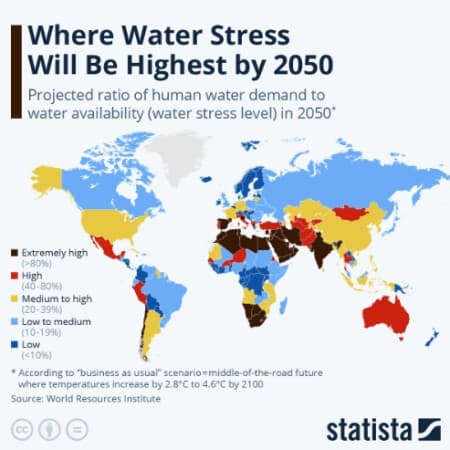Water is not only the basis of life for animals and plants, but is also likely to become a contested resource in parts of the world in the coming decades. According to UN figures, global water stress, i.e. the proportion of water withdrawn for use in industry, agriculture or private households in relation to available water, was manageable at 18.2% in 2020. In 2022, however, 2.4 billion people were living in areas that are exposed to extreme water stress in some cases.
It is not possible to determine exactly how high this will be by 2050 due to numerous factors such as the global population or economic and political developments in emerging and transition countries. This is why scientists are currently working with scenarios instead of more precise estimates. However, it is certain that the demand for water will increase steadily and that many countries are already consuming more than they have available.
As Statista's Martin Armstrong shows in the infographic below, based on projections by the World Resources Institute (WRI) , 51 of the 164 countries and territories analyzed are expected to suffer from high to extremely high water stress by 2050, which corresponds to 31 percent of the population.

You will find more infographics at Statista
According to WRI, the scenario used corresponds to a "business as usual" future with temperature increases of between 2.8 and 4.6 degrees Celsius by 2100 and a world that remains unequal. In addition to the entire Arabian Peninsula, Iran and India, most North African countries such as Algeria, Egypt and Libya are among the countries that are expected to consume at least 80 percent of the available water by 2050.
However, the phenomenon of water scarcity is not limited to emerging countries. Southern European countries such as Portugal, Spain and Italy are also reportedly already under high water stress, and the situation in Spain is set to worsen significantly by 2050. For France and Poland, the WRI experts assume medium to high water stress, which corresponds to a consumption rate of 20 to 40 percent of available resources.
By Zerohedge.com
More Top Reads From Oilprice.com:
- Oilprice Exclusive: An Interview With OPEC Sec. Gen. al-Ghais
- Why Do We Still Have Investor-Owned Utilities?
- Over 20% of the World’s Oil Refining Capacity Is at Risk of Closure



















The world is surrounded by sea water everywhere. So the answer to dealing with shortages is for the the world to come together under the banner of the United Nations to develop the cheapest and most capable water solar-powered desalination plants and help countries with the most water scarcity to install and use them.
Ten years ago I made an identical proposal to that effect to the World Bank to preside over a global research effort to develop extremely cheap water desalinations technologies and provide it to needy countries.
But fearing of the World Bank politicizing the whole venture at the behest of Western countries, I now suggest the UN to lead this effort.
Dr Mamdouh G Salameh
International Oil Economist
Global Energy Expert